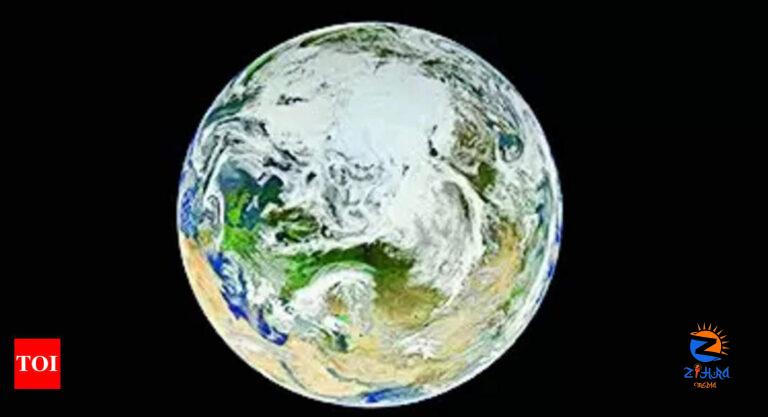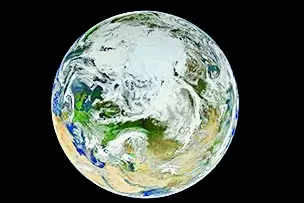
[ad_1]
Around the turn of the millennium, Earth’s spin started going off-kilter, and nobody could quite say why. For decades, scientists had been watching the average position of our planet’s rotational axis, the imaginary rod around which it turns, gently wander south, away from the geographic North Pole and toward Canada. Suddenly, though, it made a sharp turn and started heading east. In time, researchers came to a startling realisation about what had happened. Accelerated melting of the polar ice sheets and mountain glaciers had changed the way mass was distributed around the planet enough to influence its spin.
Now, some of the same scientists have identified another factor that’s had the same kind of effect: colossal quantities of water pumped out of the ground for crops and households. “Wow,” Ki-Weon Seo, who led the research behind the latest discovery, recalled thinking when his calculations showed a strong link between groundwater extraction and the drifting of Earth’s axis. It was a “big surprise,” said Seo, a geophysicistat Seoul National University.
Water experts have long warned of the consequences of groundwater overuse, particularly as water from underground aquifers becomes an increasingly vital resource in drought-stressed areas like the American West. When water is pumped out of the ground but not replenished, the land can sink, damaging homes and infrastructure and also shrinking the amount of underground space that can hold water thereafter.
Between 1960 and 2000, worldwide groundwater depletion more than doubled, to about 75 trillion gallons a year, scientists estimate. Since then, satellites that measure variations in Earth’s gravity have revealed the staggering extent to which groundwater supplies have declined in particular regions, including India and the Central Valley of California. “I’m not surprised that it would have an effect” on Earth’s spin, said Matthew Rodell, an earth scientist at Nasa’s Goddard Space Flight Center, referringto the authors of the new research, which was published this month in the journal Geophysical Research Letters.
Earth’s axis hasn’t been wandering enough to affect the seasons, which are determined by the planet’s tilt. But fine patterns and variations in the planet’s spin matter hugely to the satellite-based navigation systems that guide planes, missiles and map apps. You can’t feel it, but our planet’s rotation is nowhere near as smooth as that of the globe on your desk.
Now, some of the same scientists have identified another factor that’s had the same kind of effect: colossal quantities of water pumped out of the ground for crops and households. “Wow,” Ki-Weon Seo, who led the research behind the latest discovery, recalled thinking when his calculations showed a strong link between groundwater extraction and the drifting of Earth’s axis. It was a “big surprise,” said Seo, a geophysicistat Seoul National University.
Water experts have long warned of the consequences of groundwater overuse, particularly as water from underground aquifers becomes an increasingly vital resource in drought-stressed areas like the American West. When water is pumped out of the ground but not replenished, the land can sink, damaging homes and infrastructure and also shrinking the amount of underground space that can hold water thereafter.
Between 1960 and 2000, worldwide groundwater depletion more than doubled, to about 75 trillion gallons a year, scientists estimate. Since then, satellites that measure variations in Earth’s gravity have revealed the staggering extent to which groundwater supplies have declined in particular regions, including India and the Central Valley of California. “I’m not surprised that it would have an effect” on Earth’s spin, said Matthew Rodell, an earth scientist at Nasa’s Goddard Space Flight Center, referringto the authors of the new research, which was published this month in the journal Geophysical Research Letters.
Earth’s axis hasn’t been wandering enough to affect the seasons, which are determined by the planet’s tilt. But fine patterns and variations in the planet’s spin matter hugely to the satellite-based navigation systems that guide planes, missiles and map apps. You can’t feel it, but our planet’s rotation is nowhere near as smooth as that of the globe on your desk.
[ad_2]
